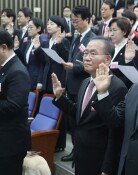Korea loses 1.67 million jobs due to net direct investment outflow
Korea loses 1.67 million jobs due to net direct investment outflow
Posted October. 15, 2013 06:15,
Net outflow in direct investment reached 120 U.S. billion dollars in the past eight years as Korean companies` overseas investment expanded while foreign investors` domestic investment plunged.
Various investment indicators compiled by the government also show the Korean economy facing the worst investment position since its bailout from the International Monetary Fund. Sluggish corporate investment incurs massive economic losses as it adversely impacts production, employment and consumption and eats into growth potential in the longer term. The past eight years of net direct investment outflow led to loss of 1.67 million jobs.
According to the Bank of Korea and Statistics Korea on Monday, net direct investment outflow between 2005 and August this year reached 123.2 billion dollars. This means that Korean companies invested more money abroad than foreign counterparts investing in Korea. Korea`s investment balance stood at a surplus immediately after the 1997 currency crisis thanks to greater market opening, but has maintained 10 billion deficit annually since 2005. While Korean companies` overseas advancement accelerated, inbound foreign direct investment plunged as anti-foreign capital sentiment spread due to the Lone Star scandal.
The rising capital outflow has led to massive decline in new jobs created in the domestic economy. According to the employment inducement coefficient of the central bank`s input-output table, around 1.67 million jobs have disappeared since 2005, which translates into 200,000 to 300,000 job losses a year.
Amid surging overseas investment, Korean companies` domestic investment has remained sluggish. According to Statistics Korea, companies` facilities investment posted negative year-on-year growth from second quarter last year through second quarter this year. The fifth straight quarter of decline is the first since the currency crisis in 1997 when facilities investment declined for six straight quarters from the third quarter of 1997 to the fourth quarter of 1998. Ahn Choong-young, chair professor at Chung-Ang University, said the "major barriers to inbound foreign investment are various regulations and militant labor union," adding, "Since the government said it will finalize economic democratization and focus on reinvigorating investment, it should create an environment where companies can expand investment without barriers."







